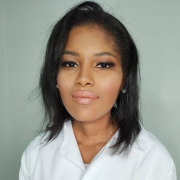How did you become interested in research relating to Hypertension?
I became interested in hypertension related research because hypertension is a highly prevalent disease and little is understood about the underlying pathophysiology and mechanisms of hypertension. I hope that contributing to our collective knowledge of hypertension will improve the health of those with hypertension and help to manage the immense cost associated with this highly prevalent disease.
Describe your research & the program/lab (info of your supervisor) that you are in?
I work in Dr. Richard Wainford’s Laboratory of Cardio-Renal research located at Boston University School of Medicine in the Department of Pharmacology & Experimental Therapeutics and the Whitaker Cardiovascular Institute. Our lab focuses on the central neural control of fluid and electrolyte homeostasis and blood pressure regulation. We use an integrative physiological, pharmacological, molecular, and gene-targeting approach to investigate anti-hypertensive role(s) of central G-alpha-subunit proteins in the endogenous GPCR-activated pathways that regulate central sympathetic outflow, fluid and electrolyte homeostasis and systemic blood pressure regulation in salt-resistant and salt-sensitive animal models. The major goal of our research is to identify underlying pathophysiology and potential treatments for hypertension. Currently, recent studies in our lab have identified a previously unknown role of hypothalamic PVN Gαi2-subunit proteins as a central molecular control mechanism mediating the suppression of renal sympathetic nerve traffic to the kidneys to influence the renal excretion of sodium to maintain a salt-resistant phenotype. These data highlight a novel organ system interaction between the brain and the kidney and continue to develop our understanding of the complex systems physiology involved in the long-term regulation of blood pressure.
My research is focused on the interaction between the sympathetic nervous system and the kidney and how that interaction mediates sodium retention in salt-sensitive hypertension. More specifically, I am examining the potential regulation of renal sodium transporters by norepinephrine-mediated signal-transduction in the pathophysiology of salt-sensitive hypertension.
What do you consider to be your substantial scientific contribution so far (provide Pubmed PMID if possible)?
I have two publications, but they are related to previous research I have done regarding Alzheimer’s disease, however, I am currently writing my very first first-author manuscript on part of my thesis project related to hypertension.
Liu Z, Zhu H, Fang GG, Walsh K, Mwamburi M, Wolozin B, Abdul-Hay SO, Ikezu T, Leissring MA, Qiu WQ. Characterization of insulin degrading enzyme and other amyloid-beta degrading proteases in human serum: a role in Alzheimer’s disease? J Alzheimer Dis. 2012; 29(2):329-340. [PMID: 22232014]
Kumar A, Zhu X, Walsh K, Prabhakar R. Theoretical insights into the mechanism of selective peptide bond hydrolysis catalyzed by [Pd(H2O)4](2+). Inorganic Chemistry. 2010; 49(1):38-46. [PMID: 19958017]
What is your favourite manuscript from a lab other than your own (provide Pubmed PMID if possible)?
If I had to choose my top 2 manuscripts, they would be the following:
Sonalker PA, Tofovic SP, Bastacky SI, Jackson EK. Chronic noradrenaline increases renal expression of NHE-3, NBC-1, BSC-1 and Aquaporin-2. Clin Exp Pharmacol Physiology. 2008; 35: 594-600. [PMID: 18177483]
Mu SY, Shimosawa T, Ogura S, Wang H. Uetake Y, Kawakami-Mori F, Marumo T, Yatomi Y, Geller DS, Tanaka H, Fujita T. Epigenetic modulation of the renal b-adrenergic-WNK4 pathway in salt-sensitive hypertension. Nat Med. 2011; 17(5): 573-580. [PMID: 21499270]
These two manuscripts are my current favorites because they are very relevant to my thesis project and I am constantly referring to both of these articles when I am talking about and thinking about my project.
What facilities are essential for your research?
In order to conduct our research, we require blood pressure monitoring equipment (i.e. BioPac software), telemetry probes/plates, metabolic cages, as well as space and supplies for basic molecular research (i.e. western blots, immunohistochemistry).
Where do your research strengths lie? Why? What are your research weaknesses? How will you improve?
Our research strengths lie in our integrative physiology approach and the experiments we perform in conscious rats which makes our data more translatable to the pathophysiology of hypertension in humans. One weakness of our research is our lack of clinical or human data; however we are currently working on this by applying to get human kidney tissue samples from a core facility at BUSM and are we are exploring collaborations to conduct human studies to investigate the underlying causes of salt-sensitive hypertension.
Describe your unforgettable (proudest) moment in science, and the most challenging situation that you have had to overcome (lessons learnt) so far?
My proudest moment thus far was winning the 2014 Caroline tum Suden/Frances Hellebrandt Professional Opportunity Award from the American Physiological Society.
I have encountered numerous challenges since I started graduate school; one challenge has been switching labs during my third year. What this experience taught me is that determination and perseverance are essential for pursuing and achieving your goals. Despite the numerous challenges that I have encountered, I have not wavered in my pursuit of achieving my goal of earning my PhD.
At which conference did you first present? How was your experience?
The first time I presented my research was at the 2013 Experimental Biology Conference in Boston at the pre-EB epithelial transport group symposium for young researchers, where I was selected for an oral presentation. I had a great first experience presenting my research at this symposium and was asked quite a few questions after my talk which I took as a positive sign about the interest level in my research.
What upcoming conferences will you be attending, and what is the furthest distance that you have traveled for a conference?
I will be attending the 2014 Experimental Biology Conference this April in San Diego, CA. The furthest I have traveled for a conference was to New Orleans, LA for the AHA’s High Blood Pressure Research Scientific Sessions and the ISH/NIN’s symposium on hypertension and cardiovascular disease in September 2013, but come April, EB2014 in San Diego will be the furthest I will have traveled for a conference.
How did you learn about ISH/NIN and its activities?
I learned about the ISH/NIN activities through my mentor, Dr. Richard Wainford. He is an active member in the society and strongly encourages his graduate students to become involved in professional societies, like ISH/NIN.
What area(s) do you wish to specialize in the future?
I would like to specialize in cardiovascular and hypertension related research and help to advance our understanding of the pathophysiology of hypertension for the creation of more targeted and efficacious treatments.
Who is your role model in Science? Why?
I admire one of my dissertation committee members, Dr. Susan Leeman because she has had an amazing scientific career and started off in science when there were very few women in university faculty positions. I appreciate her trailblazing efforts for women in the field of science as well as her tremendous contributions to science, specifically her work with Substance P.
What are your scientific goals? Advise for talented emerging scientists?
My future research goals include continuing rigorous scientific investigation to gain first author publications and carry out my research ideas to generate preliminary data and apply for an American Heart Association pre-doctoral grant for independent funding for June 2014. After the completion of my PhD in pharmacology, I would like to be able to translate the laboratory techniques I have acquired throughout my studies into research that advances our understanding of the pathophysiology of hypertension for the creation of more targeted and effective treatments. Ideally, I would like to contribute my expertise in hypertension to the pharmaceutical industry in the development of diagnostic tests for targeted/directed therapy and more efficacious drugs for the treatment of hypertension. In the long term, I would like to use my skills and expertise to launch my own company, fulfilling my entrepreneurial aspirations and continuing to pursue innovative treatment options for the management of hypertension. Throughout my career, I hope to improve the health of those with hypertension and help manage the immense costs associated with this disease.
My advice for talented emerging scientists would be perseverance and to find projects and people that make you excited and passionate about contributing to our collective knowledge of science.





















